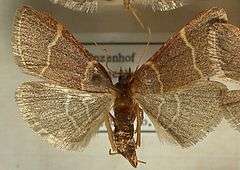Ocrasa
Ocrasa is a genus of moths belonging to the family Pyralidae. The genus is mostly treated as a synonym of Hypsopygia. If considered valid, the genus includes many species which were formerly included in Herculia.[1] In addition, the proposed genus Orthopygia, which some authors consider a separate (and sometimes monotypic) lineage is here merged with Ocrasa. The latter two genera are also mostly merged with Hypsopygia however.
| Ocrasa | |
|---|---|
 | |
| Adult specimen of Ocrasa glaucinalis, sometimes separated in Orthopygia | |
| Scientific classification | |
| Kingdom: | |
| Phylum: | |
| Class: | |
| Order: | |
| Family: | |
| Subfamily: | |
| Tribe: | |
| Genus: | Ocrasa Walker, [1866] |
| Synonyms | |
|
Orthopygia Ragonot, 1891 (but see text) | |
Selected species
- Ocrasa acerasta
- Ocrasa albidalis Walker, [1866]
- Ocrasa chytriodes (Turner, 1911)
- Ocrasa decoloralis (Lederer, 1863)
- Ocrasa fulvocilialis – sometimes still in Herculia
- Ocrasa glaucinalis – sometimes in Orthopygia
- Ocrasa nannodes – sometimes in Orthopygia
- Ocrasa nostralis (Guenée, 1854)
- Ocrasa placens – sometimes in Orthopygia
- Ocrasa repetita (Butler, 1887)
- Ocrasa tripartialis (Herrich-Schäffer, 1871)
Footnotes
- See references in Savela (2009)
gollark: OH BEE it automatically left‽
gollark: Excellent, warship is to occur, none are safe, βee.
gollark: <@231856503756161025> warship restoration?
gollark: <@160279332454006795> <@398575402865393665> needs fixing as it did not quarantine that.
gollark: Anyone got an invite link/user ID?
References
![]()
- Savela, Markku (2009): Markku Savela's Lepidoptera and some other life forms – Ocrasa. Version of 2009-APR-08. Retrieved 2010-APR-12.
This article is issued from Wikipedia. The text is licensed under Creative Commons - Attribution - Sharealike. Additional terms may apply for the media files.